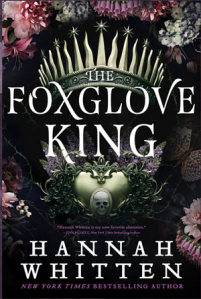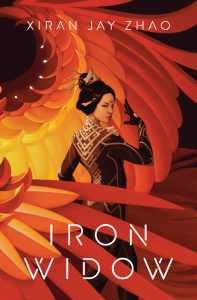Title: The Foxglove King
Author: Hannah Whitten
Genre: Fantasy
Trigger Warnings: Death, injury, violence, gore, body horror (severe), betrayal, parent death, confinement/imprisonment, religious bigotry (minor), child death (minor), religious abuse, child abuse, emotional abuse, animal death, terminal illness (mentions), child neglect (mentions), vomit (mentions)
Back Cover:
When Lore was thirteen, she escaped a cult in the catacombs beneath the city of Dellaire. And in the ten years since, she’s lived by one rule: don’t let them find you. Easier said than done, when her death magic ties her to the city.
Mortem, the magic born from death, is a high-priced and illicit commodity in Dellaire, and Lore’s job running poisons keeps her in food, shelter, and relative security. But when a run goes wrong and Lore’s power is revealed, she’s taken by the Presque Mort, a group of warrior-monks sanctioned to use Mortem working for the Sainted King. Lore fully expects a pyre, but King August has a different plan. Entire villages on the outskirts of the country have been dying overnight, seemingly at random. Lore can either use her magic to find out what’s happening and who in the King’s court is responsible, or die.
Lore is thrust into the Sainted King’s glittering court, where no one can be believed and even fewer can be trusted. Guarded by Gabriel, a duke-turned-monk, and continually running up against Bastian, August’s ne’er-do-well heir, Lore tangles in politics, religion, and forbidden romance as she attempts to navigate a debauched and opulent society.
But the life she left behind in the catacombs is catching up with her. And even as Lore makes her way through the Sainted court above, they might be drawing closer than she thinks.
Review:
I took a long time to get through this book, but it wasn’t the book’s fault. I got about halfway through it and then got in a reading slump where I didn’t feel like reading anything – even though I really enjoyed the first half of this book. But eventually I got over the slump and kept going, and of course I finished this book because there’s so much to love.
If you’ve been following this blog for more than a month or two, you probably already know that two of my favorite things for books to have are absurdly powerful protagonists and weird, creepy, and/or otherwise unique religions, the more fanatical the followers the better. So you will not be surprised to find a large part of what I liked about this book is that it has both of them.
I’m going to start by talking about the religion, because it’s foundational to the world and the magic system that our protagonist uses. First off, there is only one god, the god of light and life – because the rest of the pantheon is dead. The rotting corpse of the goddess of death and darkness, murdered by the god of light some centuries past, is buried underneath the city. Magic spills from the corpses of dead gods, which means the city is full of death magic, called Mortem – although not as much as you would expect, because an order of monks given the ability to interact with Mortem by virtue of a near-death experience are in charge of channeling it into stones and plants and otherwise keeping it from killing people. Which, despite the the fact that all of the names for people and magical forces and everything are terrible in this book, is a fantastic premise. “The gods were real and now they’re dead but their power isn’t” is one of my absolutely favorite fictional religion concepts. “Dead goddess’s corpse buried under the city” is a FANTASTIC premise. I love it.
And then we come to our protagonist Lore, who is not only the most powerful Mortem-wieldier since the necromancers were murdered, but was born with this ability for reasons that don’t get explained until the end but definitely involve our dead goddess. She grew up in a smuggler gang helping her moms move illegal drugs around the city, so she’s scrappy and fierce. But she’s actually not all that great at hand-to-hand combat and doesn’t fall into plucky YA heroine tropes. (Despite Lore being twenty-three, this whole book has a distinctly older-end-of-YA vibe.) She’s clever and fierce and powerful, but she’s also determined to survive and generally makes smart choices, which I really appreciate.
This book also gets an award for having the only love triangle I have ever read that I didn’t loathe. I actually kind of liked it. Lore is attracted to the generally kind, highly loyal, fiercely religious young monk who is assigned to both protect her and keep her from escaping while she navigates the court. She’s also attracted to the incredibly handsome bad boy Prince Bastian, who is powerful in his own way and maybe not as bad as everyone keeps telling her. There was a bit of triangle-ing and confusing pining, but I think there were really two things that kept me from hating it. One is that both guys seemed like reasonable choices, for different reasons – I didn’t feel like one was the obvious good choice and the triangle was just unnecessary complication. The other reason is that Lore refused to let the romance be any more than a background element. She is far too practical to let something silly like two hot guys distract her from what’s really important: Stopping the serial mass murder going on, unraveling the complicated plot of theoretical magic and court politics that may or may not be causing the serial mass murder, and most of all staying alive. Lore did have real human emotions and romantic feelings, but she was also relentlessly pragmatic and set on her own self-preservation, which I really loved about her.
The characters were solid, the story was delightfully twisty, the magic and religion were amazing, and the conspiracy, like a good conspiracy, turned out to be much darker and much wider-reaching than I anticipated. The only thing I didn’t actually like was the ending. It seemed far too straightforward after how complex and layered the rest of the book had been, and felt very anticlimactic. The love triangle didn’t even shake out very well because Lore did make a choice, sort of, but the nuanced relationships she had built with both men seemed to entirely vanish after the climax. Despite how much they had all been through together, they seemed cold and distant, like they were back to being total strangers again. On the whole, it felt unsatisfying.
A somewhat unsatisfying ending doesn’t negate how much I enjoyed the rest of the book, though. World, plot, characters, setting, religion, atmosphere, romance, character dynamics – up until the climax and resolution, they were all fantastic. It’s dark, it’s twisty, there’s a love triangle I didn’t hate, it’s got a dead goddess and creepy monks and creepier nuns and a massive conspiracy, and on the whole, it’s a very good book.


